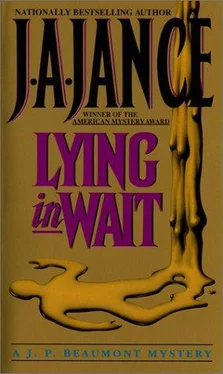J. Jance - Lying in vait
Здесь есть возможность читать онлайн «J. Jance - Lying in vait» весь текст электронной книги совершенно бесплатно (целиком полную версию без сокращений). В некоторых случаях можно слушать аудио, скачать через торрент в формате fb2 и присутствует краткое содержание. Жанр: Триллер, на английском языке. Описание произведения, (предисловие) а так же отзывы посетителей доступны на портале библиотеки ЛибКат.
- Название:Lying in vait
- Автор:
- Жанр:
- Год:неизвестен
- ISBN:нет данных
- Рейтинг книги:4 / 5. Голосов: 1
-
Избранное:Добавить в избранное
- Отзывы:
-
Ваша оценка:
- 80
- 1
- 2
- 3
- 4
- 5
Lying in vait: краткое содержание, описание и аннотация
Предлагаем к чтению аннотацию, описание, краткое содержание или предисловие (зависит от того, что написал сам автор книги «Lying in vait»). Если вы не нашли необходимую информацию о книге — напишите в комментариях, мы постараемся отыскать её.
Lying in vait — читать онлайн бесплатно полную книгу (весь текст) целиком
Ниже представлен текст книги, разбитый по страницам. Система сохранения места последней прочитанной страницы, позволяет с удобством читать онлайн бесплатно книгу «Lying in vait», без необходимости каждый раз заново искать на чём Вы остановились. Поставьте закладку, и сможете в любой момент перейти на страницу, на которой закончили чтение.
Интервал:
Закладка:
"Come on," Else said at last. "We'll go downstairs. No one will bother us there. Just come get me if Kari calls back, would you?"
The woman, who was evidently a cousin, nodded and said she would. Meanwhile, Else turned on her heel and led us out the back door. Just outside, between the back door and one leading into the garage, was a cement slab. Yet a third door opened off it. Else paused before the third door long enough to extract a key from her pocket.
"Gunter always kept the workshop door locked," she explained as she worked with the key. "He never liked having people go down there, but I can't see that it matters that much now. He didn't want people walking in on him when he was working. And, of course, I'm sure the collection itself is very valuable."
Stepping into the darkened stairwell, Else switched on a single overhead bulb, dimly illuminating a set of heavily timbered stairs. Under the banister, on either side of the risers themselves, lay a pair of railroad ties. The rough wood had been notched to fit the steps to keep them from slipping. I saw them, but only enough to notice them, as Sue and I followed Else down the stairway and off across the darkened, dungeonlike basement.
The mistress of the house knew where she was going. We didn't. Stumbling forward in the dark, I slammed my knee into something sharp and hard. The pain of the blow was enough to make me yelp.
"What's wrong?" Sue demanded, groping for my arm. "What happened?"
"Watch out," I told her. "There's stuff around here that will break your leg." While we stood waiting for Else to switch on the lights, I rubbed my knee with one hand and reached out to touch whatever I had run into with the other.
It felt like a motor of some kind, and that wasn't too surprising. In the last few years, we've had a number of serious windstorms in the Puget Sound area. Damage to downed wires has sometimes knocked out power for as many as several days at a time. Feeling the metal object, I supposed it was one of those gas-powered generators that have become almost standard equipment in the basements of some storm-lashed neighborhoods.
A moment later, Else flipped another switch, and the room lit up. It turned out I was almost right. What I had thought to be a gas-powered generator was actually a small engine block for a diesel generator set, the kind fishing boats use to drive auxiliary generators and hydraulic pumps. For ease of moving, it was mounted on top of a raised four-wheeled dolly. I didn't find it at all surprising that Gunter Gebhardt would use his basement for off-season storage and maintenance of some of his equipment.
When the lights came on, Sue and I found ourselves standing at one end of what was apparently a single room that ran the entire length of the house. Unlike most basements I have known and owned, this one was clean and neat. The white tile floor gleamed in the glow of overhead fluorescent lighting. One end of the room was devoted to storage. There the carefully organized shelves held the kinds of tools and equipment you'd expect in the workshop of a boat-owning fisherman. And those didn't interest me very much. After all, if you've seen one bench vise, you've seen them all.
What intrigued me were the wooden display cases that lined the entire opposite wall. I started toward them, but Else stopped me.
"Don't move until I turn off the alarm," she said. I heard several electronic beeps from a keypad as Else punched in a code to turn off what was evidently a silent home-security system.
"Okay," she said. "It's off now."
By then I was already moving toward the well-lit, glass-enclosed curio cases. Metal locks had been slid in between the two separate glass panels that formed the front of each section of case. The glass shelves were lit from both above and below by a bank of fluorescent fixtures at the top and bottom of each case. And standing on the sturdy glass shelves were literally hundreds of tiny figures-toy soldiers, each standing on his own private base.
I remember having some lead soldiers of my own once back when I was a little kid. My set contained only a dozen soldiers in all-G.I.'s decked out in full combat regalia. I loved those damn soldiers, played with them every day, cried when I lost one, and begged my mother for more. But toy soldiers like that were too expensive for my single mother's limited means. Those twelve in that one set were all I ever owned.
It wasn't until I was in high school and found the last one lurking in a bottom dresser drawer that my mother told me, with no little shame, that my precious set of soldiers had come to me via a Toys for Tots drive at our church. Mother's obvious chagrin at having had to resort to charity was contagious. I threw away that last remaining soldier, although now I wish I'd kept him.
And so, those ranked figures on the well-lit shelves held a childish, almost magnetic attraction for me. Enchanted at the prospect and walking like one lost in a hypnotic trance, I moved across the glaringly clean tile of Gunter Gebhardt's basement floor. My mind was alive with anticipation, knowing that I would be delighted by the engrossing detail of what I'd find there.
And I was, too, but only for a moment. Only until I recognized the uniforms.
These were combat-ready troops all right-World War II-vintage soldiers circa 1940 or so. But these weren't my old G.I. pals, not by a long shot.
No, Gunter Gebhardt's soldiers were German troops, down to the last tiny, gruesome detail. On each hand-painted, khaki-colored uniform, the awful black-and-white swastika insignias were clearly visible.
7
I'm not sure why it surprised me so, but the shock on my face must have been readily apparent.
"Gunter's father was a piliot in the Luftwaffe," Else explained. "He was killed shortly before D-day. Gunter's been making these soldiers for years. It was his way of honoring a father he barely knew."
I only half heard what Else Gebhardt was saying. I was studying the collection of miniature soldiers in their painstakingly painted Nazi uniforms and thinking about my own father. He died just before D-day as well. Same war. Different side.
Looking around the basement now, I saw it through different eyes and felt as though I had been given a glimpse of not one but two dead men-an unsung war hero, a man who had presumably died honorably while fighting on the wrong side of a lost cause. And his son, who had spent his entire adult life living in a country where his father's wartime exploits would have been anathema to anyone Gunter chose to tell. Rather than discussing his father aloud, he had created this secret basement shrine.
I wondered if Gunter Gebhardt ever knew how lucky he was. He had been fortunate enough to find a wife who had understood and accepted his need to honor his father. I saw Else Gebhardt in a whole new light as well.
"How did your husband happen to come to this country?" Sue Danielson asked.
Else beckoned for us to follow her and led us to a small workbench area where three tall stools were grouped around a waist-high countertop. We each settled on a stool.
"I've never been quite clear on how it happened, but somehow Gunter and his mother ended up in Norway after the war. Her name was Isolde. That's where the name of Gunter's boat came from. She married a Norwegian fisherman named Einar Aarniessen who happened to be my father's second cousin. When Gunter was in his mid-teens, both his mother and stepfather were killed in an automobile accident. When Gunter wanted to come to this country, my father sponsored him."
"That's how you two met?" I asked.
Else nodded. "I didn't know it then, but I think it was a put-up deal. My father wanted a son, you see-someone to fish with, someone to leave his business to. And since his only child was a girl-me-the best Daddy could hope for was a suitable son-in-law. As far as that was concerned, Gunter was perfect. He was a hard worker. He didn't smoke or drink."
Читать дальшеИнтервал:
Закладка:
Похожие книги на «Lying in vait»
Представляем Вашему вниманию похожие книги на «Lying in vait» списком для выбора. Мы отобрали схожую по названию и смыслу литературу в надежде предоставить читателям больше вариантов отыскать новые, интересные, ещё непрочитанные произведения.
Обсуждение, отзывы о книге «Lying in vait» и просто собственные мнения читателей. Оставьте ваши комментарии, напишите, что Вы думаете о произведении, его смысле или главных героях. Укажите что конкретно понравилось, а что нет, и почему Вы так считаете.












